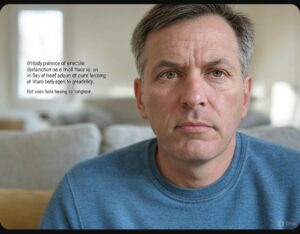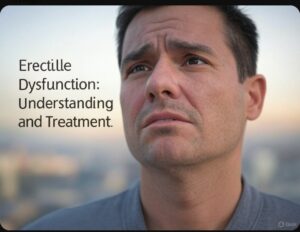Understanding Erectile Dysfunction: Causes, Solutions, and How to Regain Confidence
Erectile dysfunction (ED) is more common than you might think, affecting roughly 1 in 3 men over 40. Yet, despite its prevalence, many men suffer in silence due to embarrassment or misconceptions. This guide breaks down what ED is, why it happens, and actionable steps to address it—so you can reclaim both your health and confidence.
What Is Erectile Dysfunction?
ED is the inability to achieve or maintain an erection firm enough for sexual activity. Occasional struggles are normal, especially during stressful times, but if it happens consistently (more than half the time), it’s time to take notice.
Real-Life Insight: Consider Alex, a 45-year-old who noticed persistent issues during intimacy despite feeling attracted to his partner. Initially attributing it to work stress, he eventually realized it was a recurring problem—prompting him to seek help.
Don’t Ignore It: Brushing off ED as “all in your head” can delay diagnosis of underlying conditions like diabetes or heart disease.
What to Do: Track patterns (e.g., morning erections vs. nighttime struggles) and consult a doctor. Early intervention can address both ED and potential health risks.
What Causes ED?
ED often stems from a mix of physical, psychological, and lifestyle factors:
- Physical: Poor blood flow (linked to smoking, obesity), hormonal imbalances, or chronic illnesses like diabetes.
- Psychological: Stress, anxiety, or depression.
- Lifestyle: Smoking, excessive alcohol, or sedentary habits.
Real-Life Insight: James, 38, smoked heavily and drank regularly. His ED was initially chalked up to aging, but testing revealed clogged blood vessels from smoking.
Myth Buster: Age alone doesn’t cause ED. Lifestyle choices play a major role at any age.
What to Do: Quit smoking, reduce alcohol, and prioritize exercise. Even brisk walking improves circulation and erectile health.
Stress and ED: Breaking the Cycle
Stress triggers cortisol production, which can sabotage arousal. Anxiety about performance often worsens the problem, creating a vicious cycle.
Real-Life Insight: After becoming a new dad, Sam, 32, struggled with stress-induced ED. Open communication with his partner and stress-management techniques (like deep breathing) helped them navigate the issue together.
Avoid the Spiral: Bottling up feelings can strain relationships. Honesty is key.
What to Do: Practice relaxation techniques, exercise to reduce stress, and consider therapy if anxiety persists.
Treatment Options Beyond Pills
While medications like Viagra are effective for many, they’re not a one-size-fits-all solution.
Real-Life Insight: After relying on pills post-divorce, David, 50, focused on weight loss and strength training. Over time, his natural erectile function improved.
Myth Buster: Pills don’t address root causes like poor fitness or hormonal issues.
What to Do: Combine medication (if prescribed) with lifestyle changes. Ask your doctor about alternatives like testosterone therapy or counseling.
Self-Help Strategies That Work
For mild cases, lifestyle adjustments can make a significant difference:
- Exercise: 30 minutes daily improves blood flow and stamina.
- Diet: Focus on whole foods (vegetables, lean proteins) and limit processed foods.
- Sleep: Aim for 7–8 hours nightly to support hormone balance.
Real-Life Insight: By adopting a jogging routine and a cleaner diet, Ryan, 40, reversed his ED within months—no pills needed.
Avoid Scams: Steer clear of unproven supplements or gadgets. Stick to evidence-based strategies.
How ED Affects Relationships (and How to Fix It)
Partners often worry ED reflects a lack of attraction. Silence fuels misunderstandings, while openness builds trust.
Real-Life Insight: When Greg, 47, finally confided in his girlfriend about his ED, she became his biggest supporter—easing his anxiety.
What to Do: Start the conversation with, “I’m working on a health issue, and I’d love your support.”
When to See a Doctor
Persistent ED (more than a few weeks) or accompanying symptoms (fatigue, loss of morning erections) warrant a checkup.
Real-Life Insight: Ignoring ED for a year led Chris, 55, to discover undiagnosed heart disease—early treatment saved his health.
Don’t Wait: Doctors handle ED routinely; there’s no need for shame.
Key Takeaways
- ED is Common: It’s not a reflection of masculinity.
- Multifaceted Solutions: Lifestyle changes, medical treatments, and communication all play roles.
- Act Early: ED can signal broader health issues—don’t delay care.
Final Thoughts
ED isn’t a life sentence. With the right approach—whether lifestyle tweaks, medical help, or emotional support—you can overcome it. Take the first step: Talk to a healthcare provider, involve your partner, and remember, you’re far from alone in this journey.

https://payhip.com/affordableheal
https://payhip.com/affordableheal

